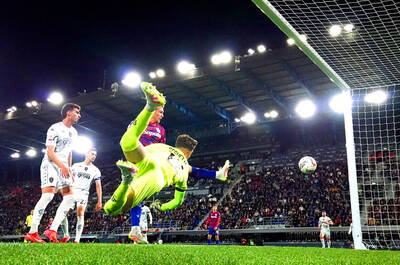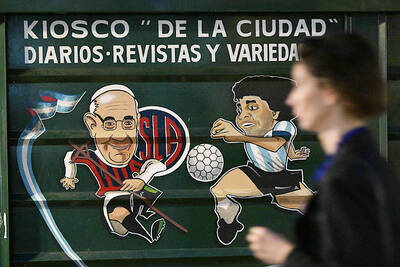Nearly one year after his report on doping in Major League Baseball, former US senator George Mitchell wouldn’t change a word of it.
His investigation tarnished the reputation of Roger Clemens and dozens of other players, led to a toughened drug agreement and created an impression that clubhouses were teeming with performance-enhancers.
“The impression I get is that it’s had a significant impact of reducing usage, although that still remains very difficult to measure with any complete precision,” Mitchell said on Tuesday during a half-hour interview in his midtown Manhattan office.
Mitchell’s 409-page report implicated seven MVPs and 31 All-Stars — one for every position. It identified 85 players to differing degrees, a list of MLB stars that included Clemens, Eric Gagne, Gary Sheffield, Jason Giambi and Troy Glaus.
“Obviously as a human being, I regret and don’t take pleasure in someone else’s misfortune, whether I have any relationship to it or not,” Mitchell said. “What we did was to try to meet the obligation which we’d undertaken, and we did so. Each player involved made his decision on how to respond.”
Still, Mitchell doesn’t think MLB’s drug problem has been totally solved.
“I would be very doubtful that it is completely clean in the sense nobody is using,” he said. “You don’t know whether this is a temporary response because of the attention it’s gotten and whether over time it will begin to resume an increase. I think that’s unlikely given the aggressive nature of the response, but it’s something you have to be continuously concerned about.”
Mitchell’s new evidence was based primarily on interviews with Kirk Radomski, the former New York Mets clubhouse attendant who pleaded guilty to illegally distributing steroids, and Brian McNamee, Clemens’ former personal trainer. It also repeated the government’s case against Barry Bonds and collected various media reports.
Some of the implicated players bounced back with relatively little stigma, a group that included Rick Ankiel, Glaus and Yankees pitcher Andy Pettitte. Some disappeared from the majors, such as Jay Gibbons, released by Baltimore during spring training.
Clemens was the report’s biggest loser.
Headed to the Hall of Fame with 354 wins before the report, his chances deteriorated when Mitchell made public McNamee’s allegations that the seven-time pitcher of the year had used steroids and human growth hormone before they were banned. It led to a high-profile congressional hearing in February in which McNamee accused Clemens’ wife, Debbie, of using HGH, and the Department of Justice was asked to investigate whether the pitcher lied when he denied McNamee’s account.
“Because the matter is the subject of both a civil lawsuit and a criminal investigation, I believe it’s appropriate for me to not make any comment,” said Mitchell, who wouldn’t say whether he had spoken with federal investigators probing Clemens.
When he released the report on Dec. 13, Mitchell recommended commissioner Bud Selig not discipline players and Selig gave amnesty to all players on April 11 in an agreement with the players’ association to toughen drug rules for the third time since 2002.
“I think it’s gone a long way toward turning the page on this issue and permitting baseball to move forward,” Mitchell said.
Just three players were suspended this year under the major league program, all for 50 games: San Francisco catcher Eliezer Alfonzo, Colorado catcher Humberto Cota and Florida pitcher Henry Owens. Suspensions were far more prevalent under the minor league program, with 66 penalties, including 40 from the Dominican Summer League and 10 from the Venezuelan Summer League.
Now, Mitchell is waiting to see if more names will be implicated in the case of Dr Ramon Scruggs and two alleged associates at the New Hope Health Center in Costa Mesa, California. A federal indictment unsealed in April charged that unidentified agents for baseball players steered clients to him.

Bologna on Thursday advanced past Empoli to reach their first Coppa Italia final in more than half a century. Thijs Dallinga’s 87th-minute header earned Bologna a 2-1 win and his side advanced 5-1 on aggregate. Giovanni Fabbian opened the scoring for Bologna with a header seven minutes in. Then Viktor Kovalenko equalized for Empoli in the 30th minute by turning in a rebound to finish off a counterattack. Bologna won the first leg 3-0. In the May 14 final in Rome, Bologna are to face AC Milan, who eliminated city rivals Inter 4-1 on aggregate following a 3-0 win on Wednesday. Bologna last reached the

If the Wild finally break through and win their first playoff series in a decade, Minnesota’s top line likely will be the reason. They were all over the Golden Knights through the first two games of their NHL Western Conference quarter-finals series, which was 1-1 going back to Minnesota for Game 3 today. The Wild tied the series with a 5-2 win on Tuesday. Matt Boldy had three goals and an assist in the first two games, while Kirill Kaprizov produced two goals and three assists. Joel Eriksson Ek, who centers the line, has yet to get on the scoresheet. “I think the biggest

From a commemorative jersey to a stadium in his name, Argentine soccer organizers are planning a slew of tributes to their late “Captain” Pope Francis, eulogized as the ultimate team player. Tributes to the Argentine pontiff, a lifelong lover of the game, who died on Monday at the age of 88, have been peppered with soccer metaphors in his homeland. “Francisco. What a player,” the Argentine Football Federation (AFA) said, describing the first pope from Latin America and the southern hemisphere as a generational talent who “never hogged the ball” and who showed the world “the importance of having an Argentine captain,

Noelvi Marte on Sunday had seven RBIs and hit his first career grand slam with a drive off infielder Jorge Mateo, while Austin Wynn had a career-high six RBIs as the Cincinnati Reds scored their most runs in 26 years in a 24-2 rout of the Baltimore Orioles. Marte finished with five hits, including his eighth-inning homer off Mateo. Wynn hit a three-run homer in the ninth off catcher Gary Sanchez. Cincinnati scored its most runs since a 24-12 win against the Colorado Rockies on May 19, 1999, and finished with 25 hits. Baltimore allowed its most runs since a 30-3 loss to